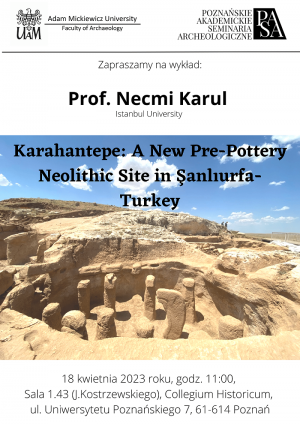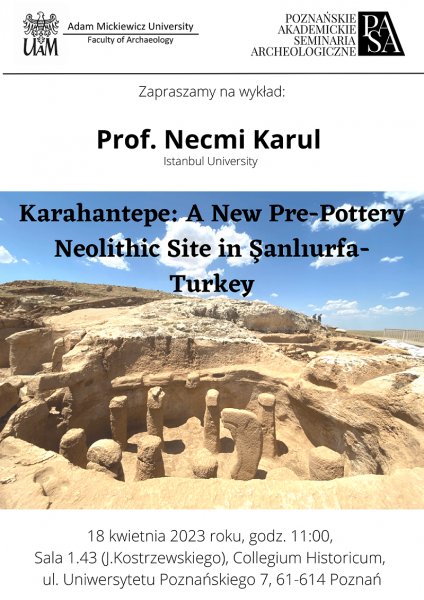Wydział Archeologii UAM oraz Poznańskie Akademickie Seminaria Archeologiczne zapraszają na wykład prof. Necmi Karula pt. "Karahantepe: A New Pre-Pottery Neolithic Site in Şanlıurfa-Turkey". Wydarzenie odbędzie się 18 kwietnia br. o godz. 11:00 na Wydziale Archeologii (Sala 1.43 (J.Kostrzewskiego), Collegium Historicum, ul. Uniwersytetu Poznańskiego 7, Poznań).
O wykładowcy
Profesor Necmi Karul jest profesorem archeologii na Uniwersytecie w Stambule i dyrektorem tamtejszego Instytutu Archeologii. Specjalizuje się w badaniach neolitu na Bliskim Wschodzie, szczególnie w Anatolii, i jest jednym z najważniejszych współczesnych archeologów tureckich. Kieruje obecnie wielkim projektem Taş Tepeler (Kamienne Wzgórza), którego celem jest rozpoznanie transformacji społeczności łowiecko-zbierackich w grupy rolnicze, które zamieszkiwały monumentalne osady wokół Równiny Harran w okolicy Şanlıurfa w południowo-wschodniej Anatolii. Osobiście kieruje badaniami wykopaliskowymi w Karahan Tepe – najważniejszym stanowisku w tym kompleksie. Jest także dyrektorem badań w Göbekli Tepe, które od 2018 roku znajduje się na Liście Dziedzictwa Światowego UNESCO. Wcześniej kierował projektem badawczym Bursa Aktopraklık Höyük w strefie południowej Morza Marmara oraz Siirt Gusir Höyük na obszarze górnego dorzecza Tygrysu.
Abstrakt wykładu (j. angielski)
Discussions on sedentism, agriculture, and animal domestication have been current issues for over a century. The focus of most of the prehistoric studies in the Near East is on the subject defined as the Neolithization Process. Recent studies in Southeastern Anatolia have started to give detailed information about the beginning of this process. After the studies carried out in the Tigris Basin due to dam projects in the past decade, new studies in the Euphrates Basin with the Şanlıurfa Neolithic Research Project (Taş Tepeler), which started recently, reveal the diversity in the region well. Here, current data on the region will be discussed, and especially on the latest excavations in Karahantepe.


